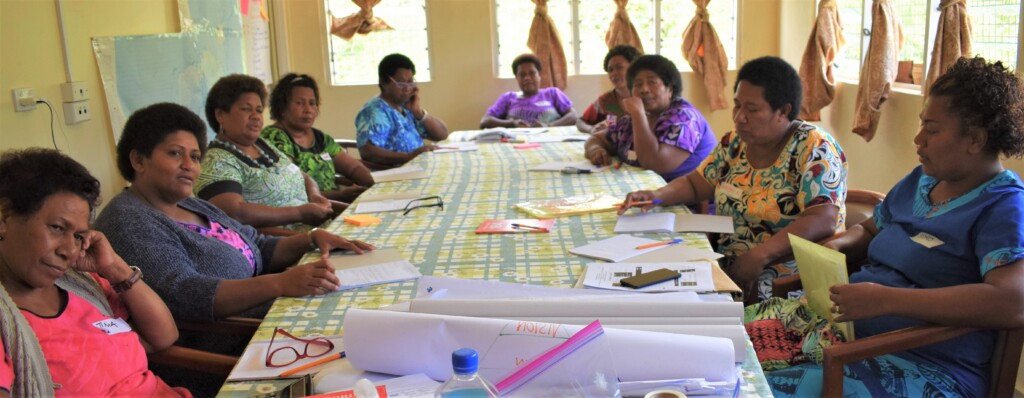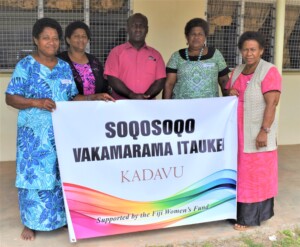Women’s groups from Kadavu focus on empowering change agents
November 30, 2020

By Neehal Khatri
Women’s groups from 5 districts (Sainima, Naceva, Nabukelevu, Ravitaki and Tavuki) across Kadavu are working together to help their members build leadership and technical skills to empower them to be agents of change in their families and communities.
The groups belong to the Kadavu arm of the Soqosoqo Vakamarama iTaukei (SSV), a women’s non-governmental organisation that works in the 14 provinces of Fiji. Through this project, 17 women’s groups are building and strengthening a coalition for change. They are empowering their members with leadership and technical skills to help them speak up, influence change and make informed decisions in their households and communities. They also hope to use this project as a model to inspire the rest of the women’s groups on the island.
According to Bulou Lusiana Duikete, president of SSV-Kadavu, the 10-month long project was designed after identifying and discussing the collective challenges faced by the groups. The project is supported by the Kadavu Provincial Council and funded by the Australian Government through the Fiji Women’s Fund.
Strengthening governance and ensuring continuity
The women’s groups from the 17 villages meet twice a month to set goals, discuss their progress and use solesolevaki (working together and sharing workload) to complete projects and tasks
Lusiana shared that most of the members of SSV-Kadavu were older women, who also held the leadership positions. She said they wanted to encourage younger women to join the groups and build their confidence to take up leadership positions.
To do this, the women’s groups have decided to start a ‘mother and daughter’ initiative, where the older members will bring young women to the meetings and provide leadership mentoring during talanoa sessions. They will also share their knowledge and skills in traditional and contemporary crafts such as weaving, cooking and sewing, among others.
In return, they hope the younger women will be able to inject fresh ideas into the groups and share the knowledge and skills they gained through secondary/tertiary education. For instance, they could help the groups with bookkeeping, writing reports and using information technology, including social media marketing.
The women’s groups are also working on improving their governance structures and processes, including documenting the constitutions and procedures for each group. They have planned leadership and governance training for the executive committee members of each group and the nominated women leaders from each of the 5 districts. Through this training, the leaders will learn about how groups operate and their roles and responsibilities.
By doing this, the women’s groups are trying to strengthen the bonds within and between their groups and ensure continuity in the long term. They also aim to increase their visibility as a coalition at the district and provincial meetings.
Building capacity and changing mindsets
 The women’s groups have identified several areas where they need to build the capacity of their members.
The women’s groups have identified several areas where they need to build the capacity of their members.
Lack of confidence to speak up during village, district and provincial meetings is a challenge they identified while designing this project. To overcome this, they will work with a consultant to provide their leaders with mentoring on public speaking and help them increase their confidence and self-esteem.
The women’s groups also identified the need for gender and social inclusion training. According to Laisa Vani, Project Secretary of SSV-Kadavu, while her husband always supported her role as a leader and encouraged her to attend workshops and meetings, there were some members’ spouses who were not as supportive.
To address this issue, there will be 2 training sessions. The first session will target the members to help them understand gender roles and stereotypes, improve communication skills and build confidence within the group. The second session will involve the wider community, including husbands of members, district leaders and representatives from the Kadavu Provincial Office. This training will help participants understand gender roles and stereotypes and encourage them to support women’s participation in leadership, decision-making and economic activities.
Increased consumption of processed food such as instant noodles and canned food has led to the prevalence of non-communicable diseases and malnutrition in children which is another area of concern for the women’s groups. To tackle this, they will work with a dietitian from the Kadavu Health Department to help them understand how they can plan healthier meals for their families.
The women’s groups are also working with Medical Services Pacific (MSP) to provide sexual and reproductive health checks and awareness training for their members. MSP reports a high level of cancer abnormalities in maritime areas as women often prioritise the wellbeing of their family members while neglecting their own. This component of the project will emphasise self-care and help the women take better care of themselves.
Financial literacy is another area where they want to improve. According to Ilaitia Raloa, Senior Assistant Roko Tui (executive head) from the Kadavu Provincial Council, while many of the households have resources and cash, they lack money management skills such as how to track expenses and save money. To overcome this, they will organise financial literacy training for their members.
This will be complemented by a game-based business startup training delivered by the Fiji Women’s Fund. In a fun and exciting way, the participants will be able to apply the financial literacy skills they learned to improve their livelihoods.
The project will also support existing income-generating activities such as poultry farming, bee-keeping and canteen business. The women’s groups will work with the Ministry of Agriculture to enhance their technical skills in farming methods.
About Soqosoqo Vakamarama iTaukei – Kadavu
The Soqosoqo Vakamarama iTaukei – Kadavu was established in 1980 and is made up of women’s groups from 75 villages in the 9 districts on Kadavu. This project is designed by a coalition of 17 women’s groups: Drue Women’s Group, Namara Women’s Group, Navuatu Women’s Group, Soso Women’s Group, Kadavu Koro Women’s Group, Nacomoto Women’s Group, Vunisei Women’s Group, Daku Women’s Group, Nabukelevuira Women’s Group, Levuka Women’s Group, Mokoisa (Naboutini) Women’s Group, Ravitaki (Namanusa) Women’s Group, Tavuki Women’s Group, Namuana Women’s Group, Natumua Women’s Group, Solodamu Women’s Group and Waisomo Women’s Group.
Recent Whats New
“She Sees Me Play”
June 30 2025
Women Lead Climate Action in Yavusania Village
June 29 2025
A Safe Haven for Women
June 20 2025
Victoria Yee appointed as Executive Director
April 1 2025
Leading Gender-Based Violence Awareness in Vanua Levu
March 19 2025
